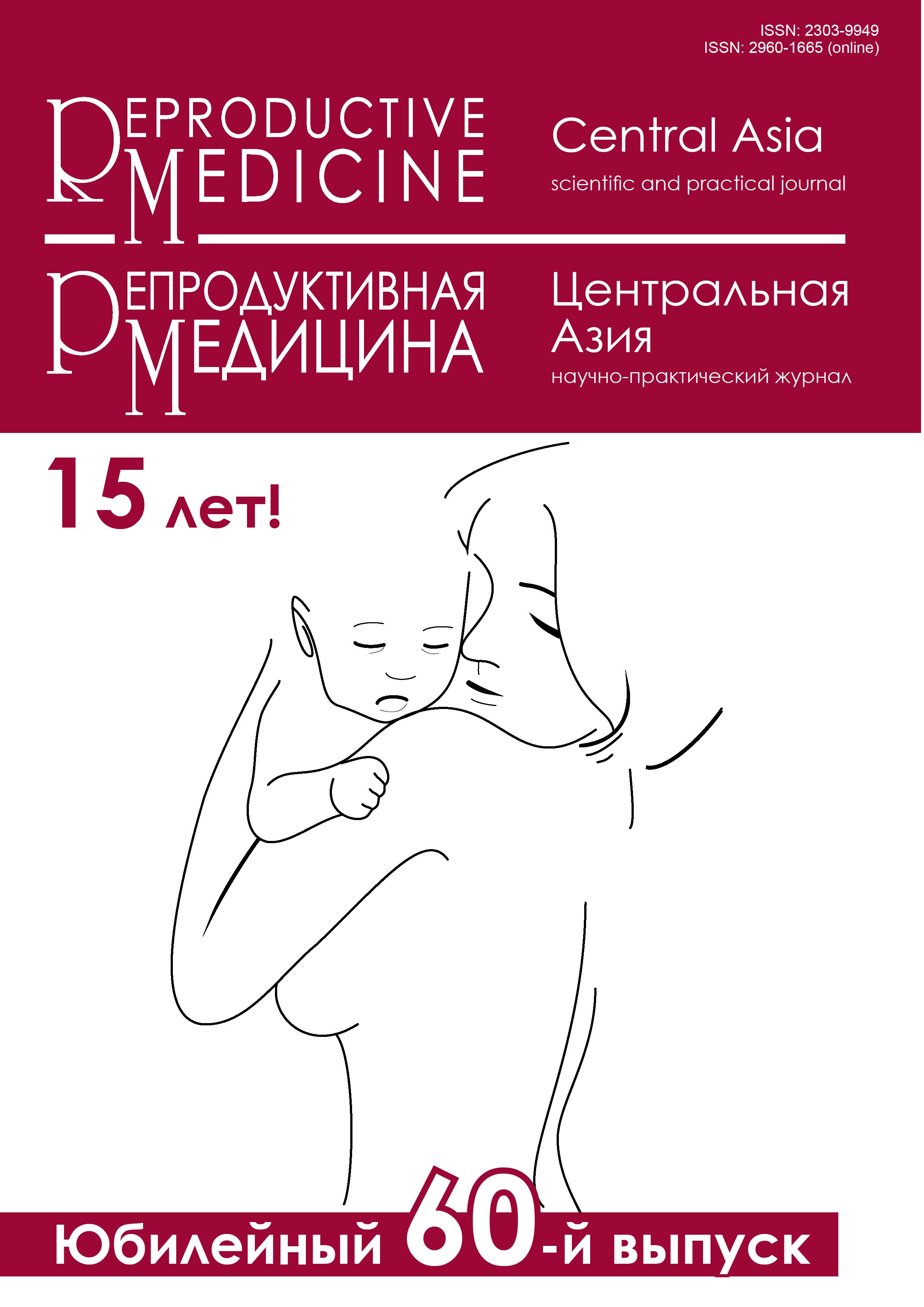The specifics of pregnancy management with thrombophilia: A clinical case
DOI:
https://doi.org/10.37800/RM.3.2024.101-106Keywords:
recurrent miscarriage, thrombophilia, low molecular weight heparins, anticoagulant therapyAbstract
Relevance: Thrombophilia is an acquired and/or genetic condition predisposing people to thromboembolism. Thrombophilic disorders increase obstetric complications, such as early pregnancy loss, fetal growth retardation, placental abruption, and preeclampsia. Recurrent miscarriage (RM) is one of the most difficult and demanding areas of medicine due to the huge emotional burden placed on families with RM. Pregnancy management in women with habitual miscarriages associated with thrombophilia requires special attention.
The study aimed to demonstrate the relationship between polymorphism genes of thrombophilia and obstetric complications by analyzing a clinical case of pregnancy in a patient with thrombophilia.
Materials and methods: The article describes a clinical case of a pregnant woman at 12 weeks of pregnancy with thrombophilia and aggravated obstetric and gynecological history.
Results: In the described clinical case, the patient underwent genetic testing for a predisposition to thrombophilia, which revealed five polymorphisms indicating an average hereditary risk for thrombophilia. The administration of an adequate dose of acetylsalicylic acid and low molecular weight heparins led to full-term pregnancy.
Conclusion: Multiple thrombophilia factors carry a significant additional risk of adverse outcomes for the mother and fetus. Early diagnosis of thrombophilia, genetic counseling, and gynecological monitoring can be very useful for preventing pregnancy complications in women with PNB, offering adequate treatment and prevention.
References
ESHRE Guideline Group on RPL, Bender Atik R, Christiansen OB, Elson J, Kolte AM, Lewis S, Middeldorp S, Nelen W, Peramo B, Quenby S, Vermeulen N, Goddijn M. ESHRE guideline: recurrent pregnancy loss. Hum Reprod Open. 2018;2018(2):hoy004.
https://doi.org/10.1093/hropen/hoy004.
Diejomaoh MF. Recurrent spontaneous miscarriage is still a challenging diagnostic and therapeutic quagmire. Med Princ Practice. 2015;24:38-55.
https://doi.org/10.1159/000365973
Зубков Д, Тайжанова Д, Амирбекова Ж, Турдунова Г, Беспалова Н. Информативность скринингового обследования параметров коагуляции для прогнозирования раннего выкидыша: обзор литературы. Репрод мед. 2022;4(53):55-62.
Zubkov D, Tajzhanova D, Amirbekova Zh, Turdunova G, Bespalova N. Informativnost' skriningovogo obsledovaniya parametrov koagulyacii dlya prognozirovaniya rannego vykidysha: obzor literatury. Reprod Med. 2022;4(53):55-62. (in Russ.).
https://doi.org/10.37800/RM.3.2022.55-62
Vomstein K, Aulitzky A, Strobel L, Bohlmann M, Feil K, Rudnik-Schöneborn S, Zschocke J, Toth B. Recurrent Spontaneous Miscarriage: a Comparison of International Guidelines. Geburtshilfe Frauenheilkd. 2021;81(7):769-779.
https://doi.org/10.1055/a-1380-3657
Deng YJ, Liu SJ, Zhao M, Zhao F, Guo J, Huang YX. Research trends and hotspots of recurrent pregnancy loss with thrombophilia: a bibliometric analysis. BMC Pregnancy Childbirth. 2022;22(1):944.
https://doi.org/10.1186/s12884-022-05210-z
Dautaj A, Krasi G, Bushati V, Precone V, Gheza M, Fioretti F, Sartori M, Costantini A, Benedetti S, Bertelli M. Hereditary thrombophilia. Acta Biomed. 2019;90(10-S):44-46.
https://doi.org/10.23750/abm.v90i10-S.8758
Clavijo MM, Mahuad CV, Reparaz MLAV, Aizpurua MF, Ventura A, Casali CE. Risk factors and role of low molecular weight heparin in obstetric complications among women with inherited thrombophilia – a cohort study. Hematol Transfus Cell Ther. 2019;41(4):303-309.
https://doi.org/10.1016/j.htct.2019.03.003
Grandone E, Piazza G. Thrombophilia, Inflammation, and Recurrent Pregnancy Loss: A Case-Based Review. Semin Reprod Med. 2021;39(1-02):62-68.
https://doi.org/10.1055/s-0041-1731827
Karadag C, Akar B, Gonench G, Aslancan R, Yılmaz N, Chalıshkan E. Aspirin, low molecular weight heparin, or both in preventing pregnancy complications in women with recurrent pregnancy loss and factor V Leiden mutation. J Matern Fetal Neonatal Med. 2020;33(11):1934-1939.
https://doi.org/10.1080/14767058.2019.1671348
Van Dijk MM, Kolte AM, Limpens J, Kirk E, Quenby S, Van Wely M, Goddijn M. Recurrent pregnancy loss: diagnostic workup after two or three pregnancy losses? A systematic review of the literature and meta-analysis. Hum Reprod Upd. 2020;26(3):356-367.
https://doi.org/10.1093/humupd/dmz048
Middeldorp S, Naue C, Köhler C. Thrombophilia, Thrombosis and Thromboprophylaxis in Pregnancy: For What and in Whom? Hamostaseologie. 2022;42(1):54-64.
https://doi.org/10.1055/a-1717-7663
Skeith L, Carrier M, Kaaja R, Martinelli I, Petroff D, Schleussner E, Laskin CA, Rodger MA. A meta-analysis of low-molecular-weight heparin to prevent pregnancy loss in women with inherited thrombophilia. Blood. 2016;127(13):1650-1655.
https://doi.org/10.1182/blood-2015-12-626739
Abbattista M, Capecchi M, Gianniello F, Artoni A, Bucciarelli P, Ciavarella A, Peyvandi F, Martinelli I. A retrospective study on the use of low-molecular-weight heparin for prevention of pregnancy-related recurrent venous thromboembolism and obstetrical complications. Blood Coagul Fibrinolysis. 2023;34(2):111-117.
Downloads
Published
How to Cite
Issue
Section
License
Copyright (c) 2024 The rights to a manuscript accepted for publication are transferred to the Journal Publisher. When reprinting all or part of the material, the author must refer to the primary publication in this journal.

This work is licensed under a Creative Commons Attribution-NonCommercial-NoDerivatives 4.0 International License.
The articles published in this Journal are licensed under the CC BY-NC-ND 4.0 (Creative Commons Attribution – Non-Commercial – No Derivatives 4.0 International) license, which provides for their non-commercial use only. Under this license, users have the right to copy and distribute the material in copyright but are not permitted to modify or use it for commercial purposes. Full details on the licensing are available at https://creativecommons.org/licenses/by-nc-nd/4.0/.




